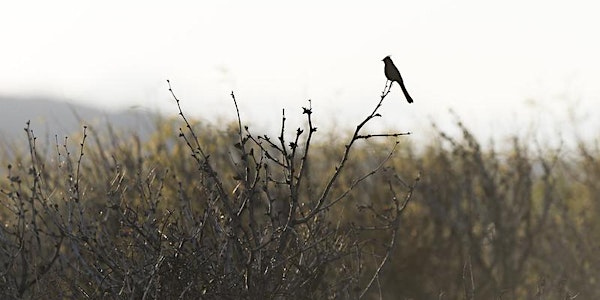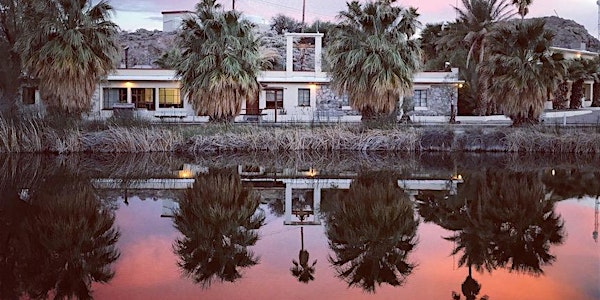

Birds of the Mojave
Learn about the wide variety of bird species during their southward migration at the Desert Studies Center!
Date and time
Location
Desert Studies Center
49441 Zzyzx Road Baker, CA 92309Refund Policy
About this event
Oases in the Mojave Desert are used by a wide variety of bird species every fall as stopping points during their southward migration. This course examines the important role of these stopover areas in the conservation of neotropical migrant birds and introduces the techniques used to identify the common families of birds found in the vicinity of the Desert Studies Center, where more than 240 bird species have been recorded. We'll caravan to nearby locations that serve as migrant “traps” to observe both migrant and resident birds in their natural habitats and learn about ecology, natural history and special adaptations to the harsh desert environment. This weekend course is appropriate for ornithology students of all levels, teachers looking for useful classroom ideas, and also those interested in general desert ecology. Two-nights’ lodging and five meals are included with the course fee.
Activity level: MODERATE
Participants will take short walks each day, totaling no more than two miles per day with elevation gains/losses of no more than 200 feet. Participants may walk over uneven surfaces, including sandy washes or dunes.
Please contact us if you have questions about your ability to participate desertintitute@joshuatree.org
Program Agenda:
Day 1: Tuesday, April 30
We’ll meet on zoom at 7:00 pm (link sent after registering) for an introduction to bird identification, classification, local families, migration, and conservation. We’ll discuss the weekend activities and answer any questions you have about the weekend.
We’ll finish by 8:30p.
Day 2: Friday, May 3rd
Arrive at the Desert Studies Center anytime between 5 and 7p and get settled in for the weekend. Please plan to eat before you arrive or bring dinner with you.
Day 3: Saturday, May 4th
We’ll get started early with a short bird walk around Lake Tuendae at 6:30a. Breakfast will be served at 7:00a, and after that we'll depart DSC for Shoshone near Death Valley National Park. We’ll visit the petroglyphs along Zzyzx Road, the gas station if people need to fill up, Chet Huffman Park, Salt Creek, Dublin Gulch, and a pupfish preserve and birding trail in Shoshone. We’ll have lunch in a shady area outside the Crowbar restaurant around 12:30p, and afterwards take a nature walk through the oasis and adjacent riparian areas of China Ranch. We’ll depart China Ranch around 3:30p and should arrive back at DSC around 4:30p.
Day 4: Sunday, May 5th
We’ll start with another 6:30a birding session at DSC followed by 7:00am breakfast. We will bird around the DSC this morning, visiting the “goat farm” as we also learn more about the unique history of this place. We will then pack up our stuff, clean out our rooms, and pack our box lunches to go before departing DSC around 11a. Our final stop will be the famous Baker sewage ponds to look for waterfowl, gulls, terns, shorebirds, other waders, and even a few interesting land birds. Class will end around noon.
Please note: There is no cell service in the park! Please allow ample time to arrive at the meeting location; park entrances may be very busy on weekends (see FAQs). Please make sure you check weather conditions and dress accordingly.
Get to know your instructor:
Kurt Leuschner is a Professor of Natural Resources at College of the Desert. Leuschner's specialties include ornithology, entomology, and desert ecology. He has led hundreds of field trips both locally and as far afield as Africa. He teaches natural history courses for the Desert Institute, the Living Desert, California State Parks, Riverside County Parks, and many other conservation organizations.
What's included?
- First aid and emergency supplies for the group
- Five meals (Saturday breakfast through Sunday lunch)
- Two-nights’ lodging (dormitory-style rooms)
What's Not included?
- Transportation
- Snacks
- Water/drinks
What to Bring:
The essentials for all field courses:
- Water, between 3 and 4 liters per person for a full day outing
- Food and snacks, easily packed and eaten in the field (please leave no trace)
- Close-toed athletic shoes or hiking boots; no sandals, not even hiking sandals!
- Sun protection: hat, sunglasses, sunscreen; light-colored long-sleeved shirts are recommended and very effective on hot days
- Warm layers for cooler mornings/evenings (it can be surprisingly cold!)
- Backpack to carry food, water, and any personal items you need for the day
Required for this course:
- Sleeping bag or set of bed sheets (full size bed)
- Pillows
- Flashlight or headlamp
- Toiletries and towel (communal bath house)
- Water, between 3 and 4 liters per person for a full day outing; there is potable water onsite, please bring a reusable water bottle or reservoir
- Food and snacks, easily packed and eaten in the field (sack lunch provided for both Saturday and Sunday)
- Sturdy closed-toe athletic shoes or hiking boots; no sandals, not even hiking sandals!
- Sun protection: hat, sunglasses, sunscreen; light-colored long-sleeved shirts are recommended and very effective on hot days
- Warm layers for cooler mornings/evenings (it can be surprisingly cold!)
- Backpack to carry food, water, and any personal items you need for the day
- Notebook and pencil are always good to have
Recommended
- Hiking poles
- Binoculars
Suggested reading
- National Geographic Field Guide to the Birds of North America by Jon L. Dunn
- Merlin bird app for your phone (free)
- Introduction to California Birdlife, Jules Evens & Ian Tait, UC Press
- Sibley's Birding Basics, David Sibley
- The Birder's Handbook: A Field Guide to the Natural History of N.A Birds by Paul Ehrlich
A detailed packing list and additional details about this activity can be found on our website. Upon registration, you will receive a digital park pass and paperwork to complete before the event start date. If you have questions, give us a call at 760-819-4714 or email us at desertinstitute@joshuatree.org
Photo Credit: NPS/Brad Sutton
Photo credit: Desert Studies Center
Frequently asked questions
Waiver: All participants must complete the participation waiver at least 24 hours before a class begins. Failure to do so may forfeit your right to participate.
For classes inside Joshua Tree National Park, participants are now required to purchase a park pass. A day pass is $30 per vehicle, $55 for a year pass, $25 for a motorcycle pass, and $15 for a bicycle/pedestrian pass.
Desert Institute will provide a full refund if we are notified 14 days in advance. If we are notified less than 14 days in advance, we are unable to process refunds for any reason. (But we would like you to notify us if you are unable to attend.)
Desert Institute runs classes rain or shine. If we do not meet our minimum of 4 registered participants for any given activity, we will cancel the activity with 48+ hours notice. We recommend that you purchase travel insurance to protect expenses we cannot reimburse, such as airfare and hotel.
Only registered participants may attend Desert Institute activities unless noted in the activity description. If this is a kid-friendly activity, please make sure your child(ren) meets the age requirements. As much as we love our pets, we don’t allow them in the field with any of our activities.
Organized by
Exploring Nature through Education
The Desert Institute at Joshua Tree National Park is an adult education program offering an in-depth exploration of the park’s natural wonders. Learn from highly qualified instructors who are passionate about sharing their expertise, and committed to providing a personal and fun learning experience. The Desert Institute is sponsored by the Joshua Tree National Park Association, and operates with the full endorsement of the National Park Service. Join us this season for an educational adventure.